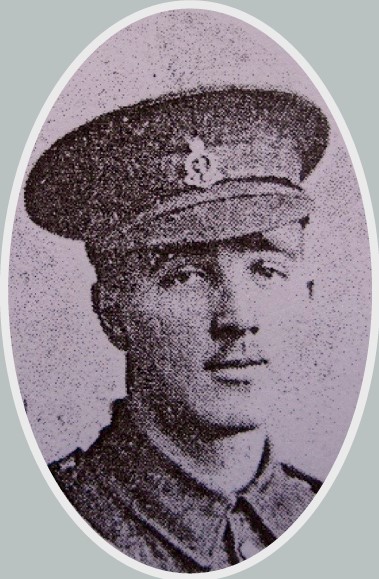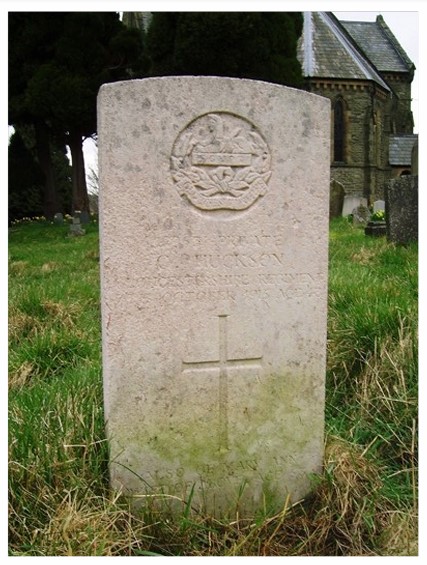‘G’ Company, Royal Army Medical Corps

Albert Hudson was born in Cheltenham on 22 October 1895, the son of Albert Edward Hudson, Chief Sanitary Inspector for Cheltenham Corporation and Plumbing Instructor at the School of Science, and Maria Hudson of Southborne House, Gloucester Road, Cheltenham. He was educated at Christchurch PE School and Cheltenham Grammar School from 1908 to 1910, after which he was employed as a clerk for Boots the Chemist in Cheltenham and later in Gloucester.
He enlisted in the Army (for the duration of the war) on 10 August 1914 at Gloucester and was posted to the Royal Army Medical Corps. According to his surviving Service Record he was posted to 80th Field Ambulance, within 26 Division on 19 June 1915 and by 1 September of that year was acting Corporal. The 80th Field Ambulance was sent to the Salonika Front in November 1915 but it would appear that Albert Hudson remained behind in the UK, probably transferring to the Corps depot. Having reverted to his original rank he was made up to full Corporal on 10 August 1916.
He died as a result of a railway accident on 2 September 1916, aged 20. He was buried in Cheltenham Cemetery, with the grave marked by a CWGC head-stone. He is commemorated on the Cheltenham Town War Memorial and also that at Pates Grammar School. There is a photo-graph of him in The Graphic of 9 September 1916.
Details of the inquest into his death are as follows: The adjourned inquest into the death of Corporal Albert Hudson, aged 20 years, who was attached to the Royal Army Medical Corps at Codford was held at Sutton Veny Military Hospital on Friday afternoon before Dr Bond, Deputy Coroner for West Wiltshire. Corporal Albert Hudson, a native of Cheltenham, was killed in the Great Western Railway accident at Warminster on 2nd September, 1916. At a previous enquiry, it was stated that Hudson died on admission to the hospital from extensive burns to his body and his death was attributed to shock caused by burns. Driver Albert E Davis, of Westbury, said he took over the driving of the 8.58pm train from Bath to Codford on September 2nd. He relieved another driver at Westbury at 9.35pm, and drove it to Warminster, where his fireman received instructions from a shunter to cross over on to the up line. This was done, and after waiting for about 15 minutes on the up line a train from Salisbury came along and ran into them. Harold John Allen, GWR fireman, of Westbury, corroborated.
Albert Henry Elliott, 32, Clifton Road, Salisbury, said he was guard on the Bath to Codford train. It was the first time he had been down on this particular train, and did not know whether it was usual to cross over. Mr Witherington (who appeared for the Railway Company) said the train was booked to cross over at Warminster.
The witness described the result of the collision. The front carriage of the stationary train was telescoped and caught fire, and Hudson was removed from the wreckage in a dying condition. Edward Sims, signalman at Warminster Station, said he came on duty at 10 o’clock. The Bath train was then standing at the station and he was asked to shunt it over on the up line. After the train had been transferred he offered the warning to Heytesbury that the line was blocked at Warminster Station, and the driver of the Salisbury train should have been warned by the Heytesbury signalman that his line was obstructed. The distant signal and the home signal were all at danger. In reply to Colonel Alexander, witness said it was usual for the train to be shunted on to the up line on Saturday nights. The driver of the Salisbury train should have slowed up at the distant signal, and when he saw the home signal against him he should have stopped.
Signalman William Francis Bailey, of Heytesbury, spoke as to receiving the warning from Warminster, and said he verbally warned the driver of the Salisbury train who replied “All right.”
George Redwood, GWR Guard, of Ashfield Road, Salisbury, said he was in the rear of the 9.30 train from Salisbury to Trowbridge. As far as his recollection went he did not think the train had been previously pulled up before reaching Warminster Station, but he would not be certain. The Salisbury train was not travelling at an excessive rate – about 20 miles an hour.
Percy Roy Staples, of Bemerton, fireman of the Salisbury train, said he heard the instructions given by the signalman at Heytesbury to Driver Stretch that the section was clear, but station blocked at Warminster. The driver said, “All right.” It was the driver’s duty to look out for the signals, but if not otherwise engaged the fireman also looked out. He was on the point of doing so when the driver shouted “Whoa!” Witness immediately put on his hand brake, and the driver put on his vacuum brake. Ernest Stretch, of George Street, Salisbury, said he had acted as engine driver for nearly five years, and was driving the Salisbury train on September 2nd. He did not remember receiving any instructions at Heytesbury or seeing the signals. He did not remember anything after reaching Heytesbury.
After the jury had consulted in private, the foreman said they were agreed that Corporal Hudson came to his death in a railway accident at Warminster on September 2nd, the cause of the accident being a collision of the 9.30pm train from Salisbury with the down train, which train was standing on the up line. They found that the accident was caused by negligence on the part of the driver of the Salisbury train in passing the signals, which were against him, but they did not consider there was any criminal negligence. The jury expressed a hope that there would be some safer form of lighting the carriages other than by gas.
They desired to express condolence with the family of Corporal Hudson.
Wiltshire Autumn Assizes 1916 October 22nd Sequel to Warminster Railway Accident
Ernest George Stretch, the driver of the train from Salisbury, was, however, indicted for the manslaughter of Hudson. The evidence was as already stated, with the small nuggets added that Hudson was killed by burns sustained from burning gas in his coach, and that Stretch was knocked unconscious and sustained concussion, which accounted for his lack of memory of the accident.
Lawyers argued – as they tend to do – about the fine points of culpable negligence and accidental negligence, and in the end the jury found defendant Not Guilty. He was discharged, and we gather at the end that he has been working most recently at boiler cleaning, having been taken off driving.

GRA
26 January 2013
Acknowledgement to Leaving all that was dear –Cheltenham in the Great War by Joe Devereux and Graham Sacker
